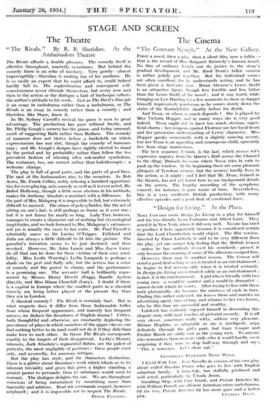" The Rivals." . By R. B. Sherid.4n. Ambassadors Theatre
The. Rivals affords a double pleasure. The comedy itself is effective throughout, masterly sometimes. But behind the comedy there is an-echo of mockery. Very gently—almost imperceptihly—Sheridan is making fun of his medium. He is so, easily an expert that he could afford to, could indeed hardly • fair. to. Hii Sophistication and consequent self- conscionSness never obtrude themselves, but every now and then in the action or the dialogue a hint of burlesque reflects the author's attitudito his work. Just as The Devil's Disciple is an essay in melodraina rather than a melodrama, so The Rivals is an essay in comedy rather than a comedy ; and Sheridan, like Shaw, knew it.
In Mr. Sydney Carroll's revival the piece. is seen to great advantage. The production has pace without bustle, and Mr. Philip Cough's scenery has the prime, and today unusual, Merit- of suggesting Bath rather thati Bedlam. The comedy of manners does not thrive before a backcloth on which expressionism has run- riot, though the comedy of humours may ; and Mr. Gough's designs have rightly elected to stand by the period and by probability rather than follow the too prevalent fashion of whoring after sub-realist symbolism. The costumes, too, are correct rather than kaleidoscopic : welcome change.
The play is full of good parts, and the parts of good lines. The =St at the Ambassadors rises to the occasion. As Bob Acres, Mr. Frank Cellier, nobly refusing a hundred opportuni- ties for-over-playing, acts comedy as well as it is ever acted. Mr. Baliol Holloway, though a little more obvious in his methods, makes Sir Anthony Absolute a martinet with a difference. In the part of Mrs. Malaprop it is impossible to fail, but extremely difficult to succeed. The abuse of polysyllables, like the act of sitting on one's hat, is still perhaps as funny as it ever was ; but it is not funny for nearly so long. Lady Tree, however, manages to create a character out of nothing but etymological ineptitudes, and we look forward to Mrs. Malaprop's entrances, not (as is usually the case) to her exits. Mr. Paul Farrell is admirably suave as Sir Lucius O'Trigger. Falkland and Julia are always a little diflicult to lit into the picture. The parodist's intention seems to be just declared, and then revoked. However, Mr. John Laurie and Miss Joyce Carey do all that can be done for these victims of their own sensi- bility. Miss Leslie Wareing's Lydia Languish is perhaps a shade on the pert and fluffy side, but the actress has a sense of comedy and the power to charm, and the performance is a promising one. The servants' hall is brilliantly repre- sented -by. - Messrs. Henry Hewitt . (Fagg), Randle Ayrton (David), and Miss Diana Churchill (Lucy). I doubt if there is a capital in Europe where the smallest parts in a classical Comedy are being better played at the present day than they are in London.
A classical comedy? The Rivals is certainly that. But in
what respects does it differ from those fashionable trifles from whose frequent appearance, and 'scarcely less frequent success, we deduce the decadence of English drama ? Critics, both -thoughtful and otherwise, are constantly deploring the prevalence of plays in which members of the upper classes can find nothing better to do (and could not do it if they did) than make love to 'each other. In theme The Rivals corresponds exactly to the targets of their disapproval. Lydia's literary interests; Jack Absolute's regimental duties, are the palest of pretexts; the most negligible of pastimes : these people exist only, and avowedly, fOr amorous intrigue.
But the play has style, and the characters distinction.
There is aglitter about Sheridan's work which blinds us to its inherent triviality and gives this piece a higher standing, a greater power to persuade, than its substance would seem to warrant. .The dialogue delights the ear. We are throughout conscious of • being entertained by something more than ingenuity and address. Real wit commands respect, however employed ; and it is impossible not to respect The Rivals. PETER FLEMING.










































 Previous page
Previous page